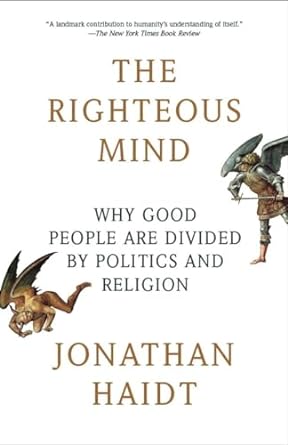More on this book
Community
Kindle Notes & Highlights
Read between
May 2 - June 23, 2025
We do moral reasoning not to reconstruct the actual reasons why we ourselves came to a judgment; we reason to find the best possible reasons why somebody else ought to join us in our judgment.36
But intuitions (including emotional responses) are a kind of cognition. They’re just not a kind of reasoning.
Wouldn’t it have been most adaptive for our ancestors to figure out the truth, the real truth about who did what and why, rather than using all that brainpower just to find evidence in support of what they wanted to believe? That depends on which you think was more important for our ancestors’ survival: truth or reputation.
I’ll praise Glaucon for the rest of the book as the guy who got it right—the guy who realized that the most important principle for designing an ethical society is to make sure that everyone’s reputation is on the line all the time, so that bad behavior will always bring bad consequences.
Accountability increases exploratory thought only when three conditions apply: (1) decision makers learn before forming any opinion that they will be accountable to an audience, (2) the audience’s views are unknown, and (3) they believe the audience is well informed and interested in accuracy.
We should not expect individuals to produce good, open-minded, truth-seeking reasoning, particularly when self-interest or reputational concerns are in play. But if you put individuals together in the right way, such that some individuals can use their reasoning powers to disconfirm the claims of others, and all individuals feel some common bond or shared fate that allows them to interact civilly, you can create a group that ends up producing good reasoning as an emergent property of the social system.
After three days and a welter of feelings I’d never felt before, I found a solution to my dilemma. I put an American flag in one corner of my rear windshield, and I put the United Nations flag in the opposite corner. That way I could announce that I loved my country, but don’t worry, folks, I don’t place it above other countries,
We lie, cheat, and cut ethical corners quite often when we think we can get away with it, and then we use our moral thinking to manage our reputations and justify ourselves to others. We believe our own post hoc reasoning so thoroughly that we end up self-righteously convinced of our own virtue.
Every person alive today is descended from just a few thousand people who made it through one or more population bottlenecks.
The hive switch, I propose, is a group-related adaptation that can only be explained “by a theory of between-group selection,” as Williams said.4 It cannot be explained by selection at the individual level. (How would this strange ability help a person to outcompete his neighbors in the same group?)
If religion is a virus or a parasite that exploits a set of cognitive by-products for its benefit, not ours, then we ought to rid ourselves of it. Scientists, humanists, and the small number of others who have escaped infection and are still able to reason must work together to break the spell, lift the delusion, and bring about the end of faith.
“To invest social conventions with sanctity is to hide their arbitrariness in a cloak of seeming necessity.”
As Wilson put it, they help people “to achieve together what they cannot achieve on their own.” But that job description applies equally well to the Mafia.
But philosophers are rarely interested in what people happen to think.
But in the last twelve years Americans have begun to move further apart. There’s been a decline in the number of people calling themselves centrists or moderates (from 40 percent in 2000 down to 36 percent in 2011), a rise in the number of conservatives (from 38 percent to 41 percent), and a rise in the number of liberals (from 19 percent to 21 percent).3
Two to four percentage points doesn't seem like a big enough change to be significant. 36% moderate seems surprisingly high!
The idea for this task came from Dan Wegner, who got it from an episode of The Simpsons in which Bart sells his soul to his friend Milhouse.
long-standing ideological struggles almost invariably involve people who are pursuing a moral vision in which they believe passionately and sincerely. We often have the urge to attribute ulterior motives to our opponents, such as monetary gain. This is usually an error.
Morality is, in large part, an evolved solution to the free rider problem. Hunter-gatherer groups and also larger tribes can compel members to work and sacrifice for the group by punishing free riders;
Harris elevates belief to be the quintessence of humanity: “The very humanness of any brain consists largely in its capacity to evaluate new statements of propositional truth in light of innumerable others that it already accepts” (ibid., p. 51). That’s a fine definition for a rationalist, but as a social intuitionist I think the humanness of any brain consists in its ability to share intentions and enter into the consensual hallucinations (i.e., moral matrices) that create cooperative moral communities.


